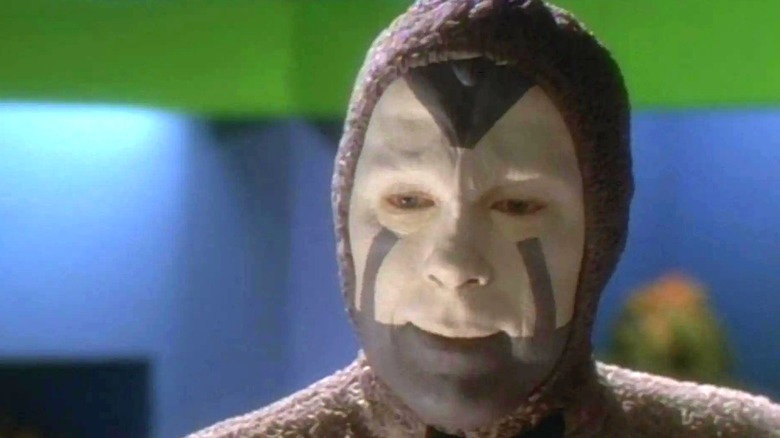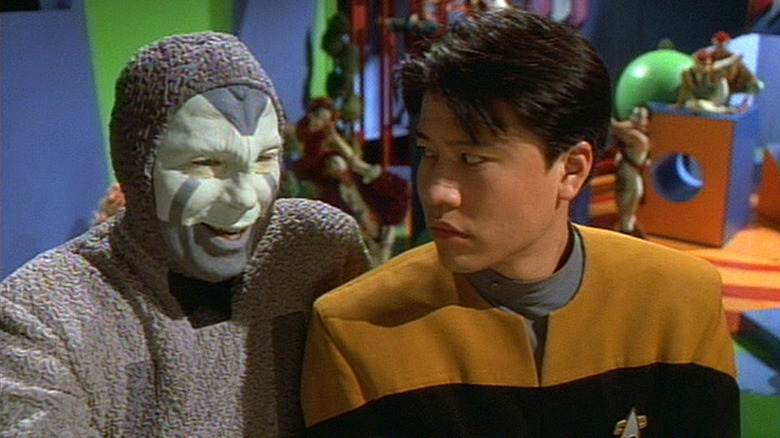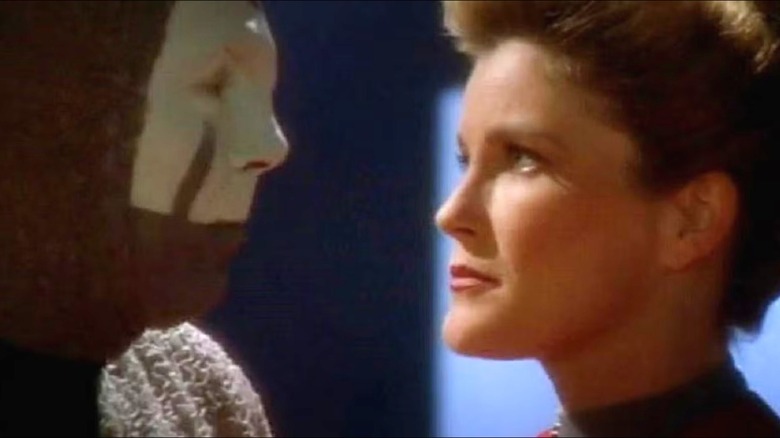Star Trek: Voyager Showcased A Terrifying Villain Played By A Comedy Legend
In the third season "Star Trek: Voyager" episode "The Thaw" (April 29, 1996), the U.S.S. Voyager comes upon a miniature colony on a distant planet where five people are being kept in cryogenic stasis after an unknown cataclysm. They're housed inside individual frozen coffins, and their brains are wired into a Matrix-like virtual reality simulation. Two of the five people have recently died of heart attacks, and the Voyager crew are curious as to what their simulated world looks like.
Harry Kim (Garrett Wang) and B'Elanna Torres (Roxann Dawson) jack into the simulation, and find a Cirque du Soliel-like nightmare world. The miniature world is occupied by sadistic acrobats and masked monsters that torment the three still-living colonists. The colonists are depressed and defeated, beaten into complacency by the circus creatures. The ringleader of the sadists is the Clown, a gray-and-white ghoul who has assured that this electric dimension is ruled by fear and pain. The Clown is played by comedy legend Michael McKean, perhaps best known for "Clue" and "This is Spinal Tap" in the '80s, and "Better Call Saul" and "The Diplomat" today. He has hundreds of other credits besides, and is currently starring in a Broadway revival of "Glengarry Glen Ross."
Not only is the Clown torturing the colonists, but he has somehow gained mastery of the cryo-tubes in the real world, preventing escape. He is the true master of this domain, and will never let anyone go.
What is the Clown? Why is it in the VR world? The colonists will explain that the VR computer reached into their brains and extrapolated a world based on their subconscious thoughts and memories. The Clown is the manifestation of their fears, a living being that only exists to make them afraid. McKean's performance is genuinely terrifying, outstripping even Pennywise in terms of scary clowns, and "The Thaw" may be the best episode of "Star Trek: Voyager."
The Thaw questions the fuction of fear
Of course, Captain Janeway (Kate Mulgrew, who we spoke with back in 2022) has to find a way to infiltrate the nightmare VR world and extract her crew members as well as the colonists without the Clown becoming angry and killing them. This forces her to negotiate with the Clown, meaning Janeway has to, essentially, make a deal with fear itself. As such, the episode has the star asking some intriguing philosophical questions, all in the classic "Star Trek" mold. Namely: What does fear want from us? Why do we even feel fear? And, as anxious people ask themselves every day, how can we, as a species, actually defeat it?
The Clown is a brilliant personification of fear. He is up front about wanting to torment you, leaving no ambiguity as to his motivations. He also lives inside your brain, and is able to tap into your deepest nightmares, exploiting the things you're most afraid of. In Harry Kim's case, it's growing old. Naturally, the Clown transforms him into an old man. Because this is a VR world that the Clown controls, he can pretty much do anything he wants. He's a cruel, omnipotent master. A mad god hellbent on chaos. And when we're the most afraid, that's what fear can feel like. Fear is an interloper who is doing untold damage from the inside. Michael McKean, who has typically been hailed for his comedic roles, goes in the opposite direction here and represents that perfectly.
Is "The Thaw" cheap? Absolutely. The nightmare world of the Clown takes place in a tiny soundstage with bright colors and plywood walls. It looks like a set from the original "Star Trek" series, and that is meant as a compliment. There's something charming about the cheapness of "The Thaw," making it feel like classic "Trek." It's also wholly reasonable to assume that the Clown wanted his world to look like a cheap sci-fi set. There's something scarier about the tininess of his world. There's not even room to breathe.
The conclusions of The Thaw
Janeway has to be doubly clever to defeat the Clown. She not only has to use clever engineering to shunt people's consciousnesses out of its VR hard drive, but also face the Clown in person to rob him of his powers.
Being a stalwart and strong-minded person, Janeway has also come to a conclusion about fear that she hadn't considered before. Fear, she figures, serves an evolutionary function. We feel it, but it serves to make us stronger and more alert. When fear is defeated once, we have taught ourselves to defeat it again in the future. Eventually, we can face our fears more and more easily until they no longer rule us. Fear, Janeway reasons, only exists to be defeated. And if that's the case, the Clown must want to be defeated somewhere in its soul. It lives to die.
Janeway manages to hoodwink the Clown with a hologram. He lets the hostages go, thinking he'll be able to keep Janeway in his VR world, not knowing she is artificial. When the Clown learns that he is trapped in the VR world with a false person, he knows his fate. When Janeway exits, he'll be deleted forever. Janeway tells the Clown that she has defeated him ... fulfilling his ultimate desire.
"The Thaw" isn't just an intriguing story, but provides viewers with a new philosophy that might actually help them in the real world. Fearful people can now see their fear as a liar, an invader, an outside force that lives to make them afraid and uncomfortable. "The Thaw" argues that fear can be defeated, wants to be defeated. It's not permanent. Indeed, eventually, it will just fade into the blackness from whence it came. Now fear itself is afraid.


